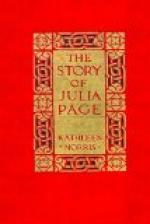He found Eileen and Phyllis more charming than ever; and he very much admired their aunt, stately Lady Violet Dray, and their bright, clever, friendly cousin Ivy, who was as fresh and breezy as the winds that blew over her native heather. Ivy was slender and vivacious; her face was thin and a little freckled, and covered with a fine blond down, which merged on her forehead into the straight rise of her carrot-coloured hair. Her eyes were sharply blue, set in thick, short, tawny lashes. She was an enthusiastic sportswoman, well informed on all topics of the day, assured of her position and sure of herself, equally at home in her riding tweeds and mud-splashed derby, and the trailing satin evening gowns that left her bony little shoulders bare, and were embellished by matchless diamonds or pearls. There was no sentiment in her, her best friends were of both sexes and all ages, but she attached Jim to her train, patronized and bullied him, and they became good friends.
Mrs. Chancellor talked well, and talked a great deal, and she stimulated Jim to talk, too. Never in his life had so constant a demand been made upon his conversational powers; and every hour with her increased his admiration for Ivy and lessened his valuation of his own wisdom. She was a thorough Englishwoman, considering everything in life desirable only inasmuch as it was British. Toward America her attitude was one of generous laughter touched with impatience. She never for one moment considered seriously anything American. Mrs. Chancellor thought all of it really too funny-"rarely too fenny,” as she pronounced it. Only one thing made her more angry than the defence of anything American, and that was dispraise of anything British. The history of England was sacred to her: London was the crown and flower of the world’s civilization; English children, English servants, English law, were all alike perfect, and she also had her country’s reverence for English slang, quoting and repeating it with fondest appreciation and laughter. Nothing pleased her more than to find Jim unfamiliar with some bit of slang that had been used in England for twenty years; her laughter was fresh and genuine as she explained it, and for days afterward she would tell her friends of his unfamiliarity with what was an accepted part of their language.
She took him to picture galleries, bewildering him with her swift decisions. Jim might come to a stand before a portrait by Sargent.
“Isn’t this wonderful, Ivy Green?” It was his own name for her, and she liked it.
“That?” A sweeping glance would appraise it. “Yes, of course, it’s quite too extraordinary,” she would concede briskly. “An impossible creature, of course; one feels that he was laughing at her all the time—it’s not his best work, rarely!” And she would drag Jim past forty interesting canvases to pounce upon some obscure, small painting in a dark corner. “There!” she would say triumphantly, “isn’t that astonishing! So kyawiously frank, if you know what I mean? It’s most amazing—his sense of depth, if you know what I mean? Rarely, to splash things on in that way, and to grasp it.” A clawed little hand would illustrate grasping. “It’s astonishing!”




